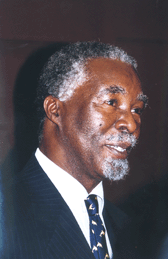SA's cash conundrum
|
South African white farmers own close to 86
percent of the land. White people constitute no more than 10 percent
of the population. How long can this skewed land ownership be
sustained? Newton Kanhema examines the
issues |
||||||||
And then at that point when a serious challenge from the opposition emerges.they will have to speak the language of the people". Jack Raath of Agri-South Africa disagrees. He is very comfortable with his government and said South Africa was lucky to have a government that has the 'right mentality on land reform'. "We are fortunate the government does not believe in taking a person from a squatter camp and give him a piece of land to farm. It is clear that our government does not want to copy that sort of model. It instils a lot of fear among our members to see it happen on our borders. We have met with government and we have been assured that they will not go that route." said Raath. But the landless South Africans have been studying the dynamics of the Zimbabwean land redistribution and believe that the environment for a spontaneous land invasion is emerging. "We have just learnt that in the last few years Mugabe used to oppose land invasions in the same way Mbeki is doing today," said Mngxitama. Mngxitama claims that the Landless People's Movement (LPM) has 10 million members throughout the country. The movement has a network that includes offices in every South African province. They are also affiliated to the Zimbabwean War Veterans Association. They have sent delegations to Zimbabwe to meet and learn the tactics of the Zimbabwean war veterans. The movement attracted the attention of the South African authorities when They organised their demonstrations during the Earth Summit. The South African National Intelligence Agency (NIA) first interrogated the movement's leaders before 72 of them were arrested just before the summit.
President Thabo Mbeki's government has assured the world that what has happened in Zimbabwe cannot happen in South Africa "because we have a land reform programme", but this will sound increasingly hollow if the land reform programme continues to fail to benefit large numbers of the landless. With a more skewed land distribution and a reform programme which has delivered less than 2% of a target set by former President Nelson Mandela in 1994, the present South African administration is faced with millions of landless people. South Africa's racial distribution of land in 1994 was sitting at about 87% white and 13% black - and that balance has changed by up to 2% in favour of blacks eight years into the new dispensation. Since the departure of Nelson Mandela in 1999, the donor funds for land reform have been cut by 50% at a time when some South Africans are growing impatient with the rate of redistribution. South Africa, which is Africa's economic powerhouse, stands threatened with the same morass as that of Zimbabwe and it is up to the international community to rally behind the South African government and help their land reform succeed. In supporting this program the International community can simultaneously protect its interest in the region. The leader of a South African opposition party, United Democratic Movement, General Bantu Holomisa who met with Robert Mugabe in early September in Johannesburg during the Earth Summit on Sustainable Development said his country had no choice but accelerate land redistribution to avoid bloodshed. "In South Africa we have to move with speed because if what is happening across the Limpopo happens here, then what is happening across the Limpopo will look like a Sunday picnic," said General Holomisa. Since 1999 the donor community has halved their support to the South African land reform programme. This is at a time when the government has announced that land redistribution is a matter as a priority. The ANC government has set its target of redistributing 30% of the land in 15 years from 2000 (a target which was initially set for the first five years into a new dispensation.) And so far the government has redistributed less than 2% of the land since 1994 and this is far less than expectation of the landless. Out of a total government spending of R258.3 billion (US$25.8 billion) projected for 2002, the government will spend R900million ($90 million) on Land Affairs, representing only 0.3% of its national budget in contrast to a staggering R48.1 billion (US$4.8 billion) representing 18.6% of the budget to be spent servicing the national debt. Following the end of apartheid the South African government has many yawning gaps to fill in education, housing and health. While the land issue is a ticking time bomb it does not feature as a key priority on the government expenditure. The slow pace of land redistribution is clearly due to lack of resources. The government's major constraint is funding. Dr. Gilingwe Mayende, director general of department of land affairs said it was self evident that the land reform is under-funded in comparison to the budget allocation of other programs like housing, which received R3.5 billion, more than three times the R900 million allocated to Land Affairs. The government is now mobilising financial resources because it believes it has put the system in place to deliver more land. "Our biggest problem is the amount of money the farmers are asking for their land, and if they are not happy they say they are not selling, so we have to go to court. The amount of money paid by the government has been inflated. Some see the program as a bonanza. The problem we are facing is greed. There is a problem of collusion between the farmer and evaluator in hiking the value of the land. Sometimes we have to bring a second evaluator," said Mayende. There is clear divergence of opinion on the land issue and the race card seems unavoidable because of the racial imbalance of the land ownership. There is a strong consensus among black people in general that land redistribution is long overdue in South Africa and that the redistribution should take place now. The consensus only weakens on the method of achieving the redistribution. |
||||||||

